I returned to my former neighborhood Wednesday evening to check out ground-zero of the latest attraction in the Biden traveling circus of migrant misery, an area once mostly populated by corporate professionals and tourists — but when I pulled up and stepped out onto a block strewn with vagrants sitting in squalor, I saw a place I could no longer recognize.
The Watson Hotel is right by my old apartment, located a few blocks away from Central Park, on the border of Hell’s Kitchen and the Upper West Side.
I have memories there, like when my wife took me to the annual New York City Gem Show the hotel hosts when we had just started dating. We got our first place together just around the block — and I broke the “Laptop from Hell” series at the New York Post from that apartment’s kitchen table. I once crawled to the City MD next door to the Watson, convinced I was deathly ill, only to be told I actually had a hangover. I had my first cigarette-free breakfast when I technically quit smoking (before becoming a casual, social, or work-purposes smoker) at Le Pain Quotidien a block over, which, by the way, was the worst breakfast of my life, and began and ended in nicotine-withdrawal-induced tears.
The other block over, I got a $60 trespassing ticket for hopping the barrier the city put up at my outdoor squash court during COVID, which I decided was worth the price of my sanity at the time. Also during the pandemic, a few blocks up, we stumbled on a group of music students from Juilliard playing on the steps of the Lincoln Center, when theatre gatherings were still banned, and live music felt like a distant memory, maybe never to be heard again. I could go on, but the point is, I go back in that neighborhood — though it’s not what I once knew anymore, now populated with more drifters and heroin addicts than anyone I was neighbors with, in what now seems like a past life.
The Watson emerged as a national focal point as a band of illegals camped outside, protesting the city’s decision to move them from the 3-star midtown digs to a tent city in downtown Brooklyn.
Last week, officials attempted to move the group of single-male lodgers to the Brooklyn Cruise Terminal, where New York City Mayor Eric Adams (D) has constructed a(nother) massive shelter for the surge of new migrants — but the Watson gang wasn’t having it. As a form of defiance, the border crossers set up an open-air homeless encampment on the street outside the hotel, demanding the city provide them with “permanent homes,” as Breitbart News reported.
“It looks like a favela out here,” I texted my boss when I stepped out of an Uber. “This is the most insane scene I’ve ever seen,” I wrote again a few minutes later, with a photo attached of some men laying on the freezing ground, wrapped in polyester fuzzy blankets (see below).
Nearly 50,000 border crossers have been bused to New York City, a “sanctuary city,” since the spring of 2022 — costing New York taxpayers more than $4 billion over the next two years, according to estimates.
Mayor Adams has been scrambling for resources to keep up with the spike in newcomers, building makeshift outdoor shelters as homeless shelters began running over capacity, and pressing the Biden Administration to execute a “decompression strategy” to spread illegals more evenly around the country amid the record smashing surge of crossings on the president’s watch.
“Through an expansive Catch and Release network, coupled with a parole pipeline, the Biden administration is fast-tracking border crossers into the U.S. interior and providing them with work permits — a boon to companies looking for new consumers, real estate investors wishing to drive up housing prices, and employers seeking cheaper labor,” Breitbart reported this week on the circumstances surrounding the national illegal immigration crisis.
And the 57th Street block between 9th and 10th Wednesday night was a real-life microcosm of that crisis, and the damage it creates in the communities it touches.
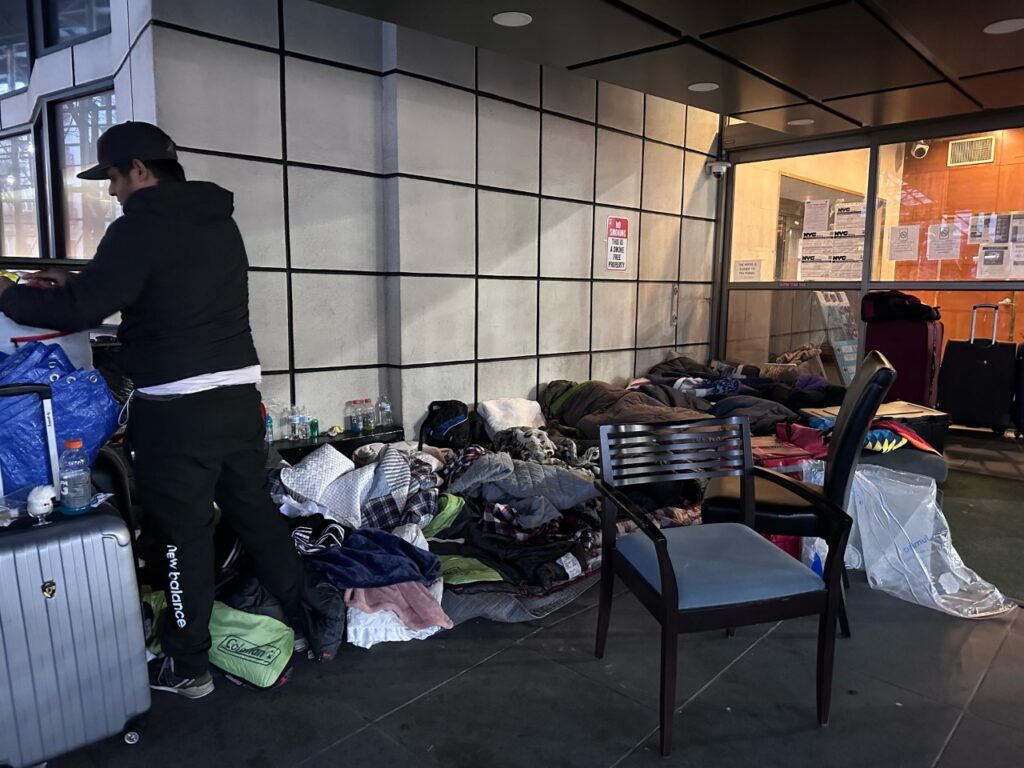
The human tide behind the open-air homeless encampment ready for another night (Emma-Jo Morris/Breitbart News)
Under scaffolding along the Watson there were groups of men, some lying on the ground under blankets, some standing around chatting and passing around cigarettes, surrounded by police officers patrolling the area.
I approached one of the men standing by a plastic folding table cluttered with Dunkin’ Donuts boxes and aluminum trays of cold food, who said he was from Colombia.
When I asked him why everyone was camping out — through the Google Translate app on my phone because he didn’t speak a word of English — he told me it was because the city was trying to take the migrants “to a place not suitable” for them.
“Why now did they take us out of the Watson Hotel to send us to a place not suitable,” the man texted me.
“The beds aren’t beds, they are cots; we have to sleep piled up [on each other], there are a few who had bad smells; the bathrooms don’t have hot water; the heating is very bad, and the transport only works very few hours,” he continued before he got snagged away by a woman in a mask loitering around the area, there to “help,” surely.
As it began to get dark I roamed into the hotel to scope out whether it was even operational anymore, or whether it had just been officially transformed into a migrant encampment.
Cops standing in the lobby refused to answer any questions, before directing me to the public information office — a refrain I have come to expect since this saga began over the summer — and shooting me back out the door. But from what I could make out, there were no legitimate check-ins.
A hotel employee told Fox News that the asylum seekers have created “total chaos” at the midtown locale.
“There’s no accountability. The city’s so-called running the program [and] allows these people to destroy these rooms. There is no daily supervision to show these people that… you don’t destroy your hotel. You are only there temporarily. This is not your home,” the employee told Fox.
“Unfortunately, the ones that are paying the price is the hotel workers, Local 6 union workers … Those guys and those ladies endure a lot of disrespect from the migrants, and there [are] some nice migrants, but there’s too much alcohol, too much drugs and too much violence, and you have teenagers… going into the staircases and making out like it’s lovers lane… This is a free-for-all,” the employee said.
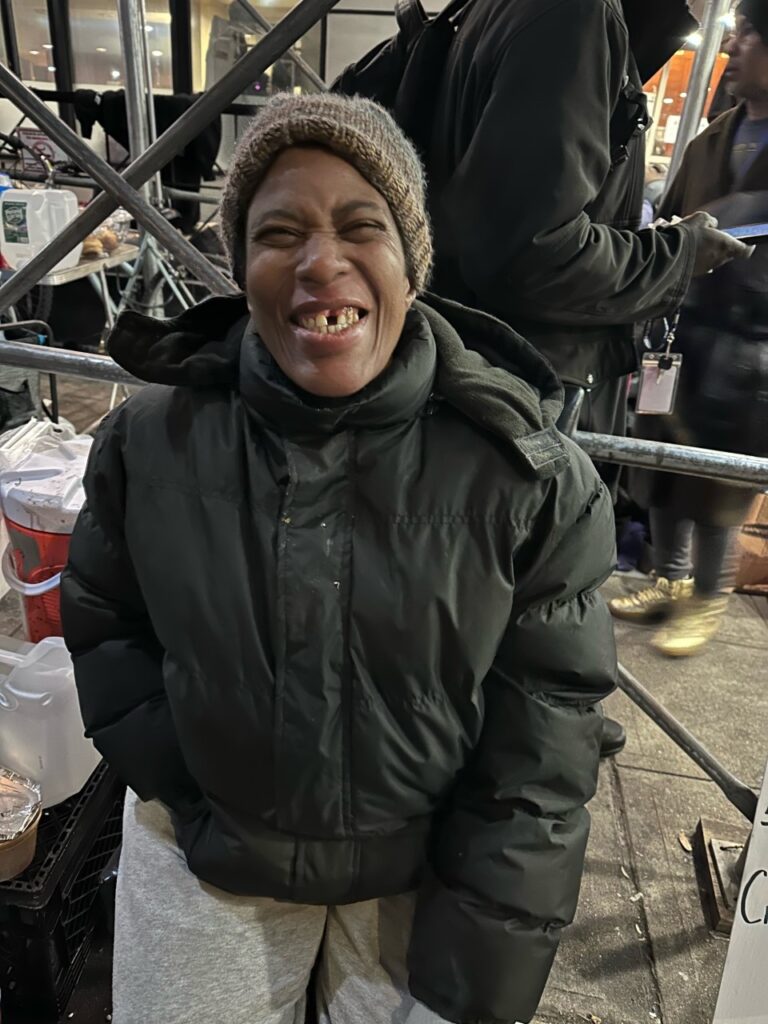
Nearly 50,000 border crossers have been bused to New York City, a “sanctuary city,” since the spring of 2022 (Emma-Jo Morris/Breitbart News)
When I got back out, I ran into a woman who identified herself as Kesha, sitting on a folding chair by the hotel entrance on the side walk. And to my surprise, Kesha spoke English!
I asked her what she was doing here, as she obviously appeared to be an American citizen. Donning a tattered puffer coat, smoking a cigarette, and missing one front tooth, she explained she was there to pick up food for her father-in-law, who she said was hungry.
I couldn’t blame her for stopping by, its not exactly a well kept secret anymore that illegals are now treated better than the growing number of American citizens in need.
I got into a conversation with her that quickly turned into somewhat of a tragic comedy as she recalled how she has “only” 27 credit cards, and apparently owns two Section 8 buildings. I refrained from forming an opinion about the veracity of her claims until I could inquire more, but the more I learned the more questions I had. She then proceeded to tell me about that she won the lottery with a ticket someone tried to wrestle her for, and about her son, called “black Jesus.” It was not lost on me that “Black Jesus” is the name of a 2014 sitcom on Adult Swim, so I Googled the actor from it and showed him to her, asking if that was her son. He was a different “black Jesus.” Go figure.
It was around that point in the conversation I figured Kesha’s story was probably not reportable. But this is a first person, so I’ll relay it.
Not that the conversation with her wasn’t riveting — it definitely was — but as Kesha and I were chatting, I caught a glimpse of the Central Park Tower, a new build that is now the tallest apartment building in New York City and apparently the tallest residential building in the world.
The glass sky-scraper provides posh residents with a 360-degree bird’s-eye-view of the city — all the glamor, but far enough away from the grime — a metaphor for what life has become in New York, with two classes living in two versions of reality.
On the block where the Watson is, a studio apartment costs upward of $3,000/month, a one-bedroom is upward of $4,500/month, and a two-bedroom goes for about $6,000, according to current listings on StreetEasy — rates an average worker on the block couldn’t even dream of affording, and for that matter, would at least require a guarantor for most of the corporate people working in the area — spiked prices even since I signed my first lease there about five years ago, despite the quality of life in the neighborhood becoming miserable.
When I zoned back in to my assignment I caught a few guys hanging out, listening to music on bluetooth speakers and smoking cigarettes.
I strolled past a sign that said “GIVE THEM WORK PERMITS,” introduced myself — albeit briefly, because, you know, English — and was immediately offered a cigarette. The chill is universal — I took it.
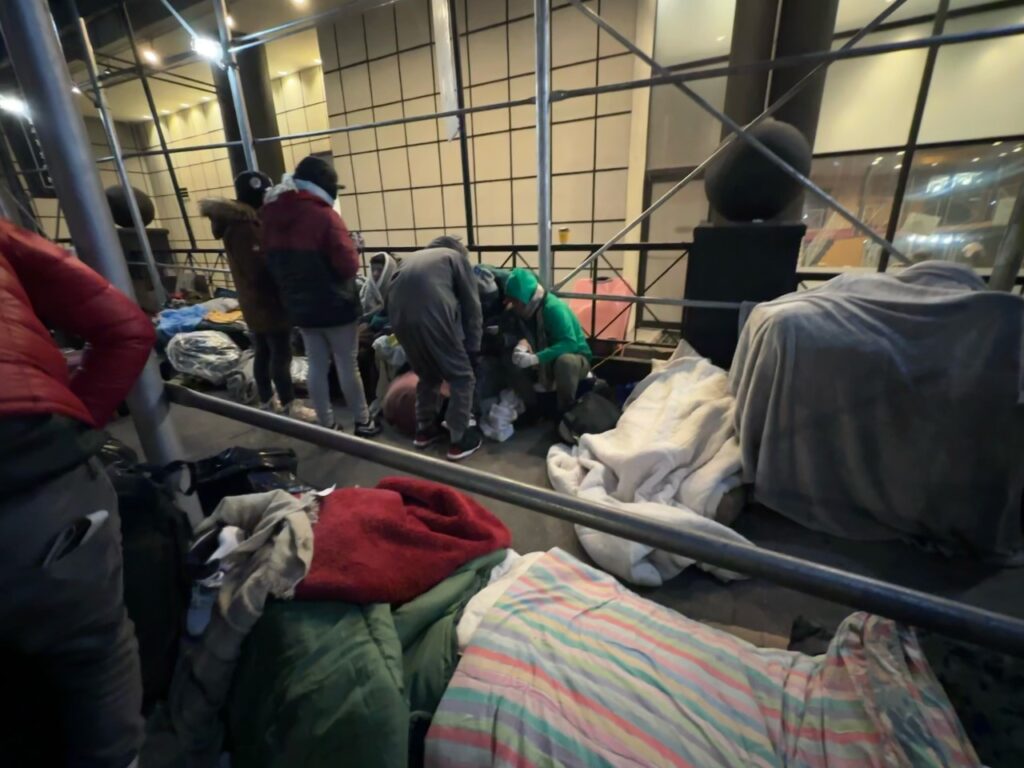
Men laying on the freezing ground, wrapped in polyester fuzzy blankets (Emma-Jo Morris/Breitbart News)
We got into a “chat” over the bass coming out of the speaker hanging around one of their necks, and I asked them what their experience was that led them to this… protest, I guess.
A young man who introduced himself as Jefferson whipped out his iPhone and began dictating.
“What happened was that – it was this – they had [this hotel] for the immigrants who are coming, right? And through I don’t know who, suddenly they took everyone out to the Brooklyn pier. And over there is too cold and it’s not the same, well, because one does not have space… Four bathroom[s] for 1,000 people,” Jefferson said. “I had previously been to a refuge where, like, for people with special mental problems and things like that, and I saw even sometimes [people] injected themselves, there were a lot of fights,” he continued, in what apparently was a description of the city shelters he encountered before he got to stay at the Watson, that he did not wish to go back to.
Having been to a men’s homeless shelter for a story I did some months ago, I could actually picture what he was talking about and felt myself starting to understand why they would be so adamant about wanting to stay at the hotel. The men’s shelters in New York are much less a refuge and more like an insane asylum with no guards.
My brow furrowed as I read his response and pulled a drag off the Marlboro Red his friend gave me.
“Where are you from,” I texted Jefferson, trying to divert the topic of conversation to something a little less heavy.
He nodded as he read and took his phone to type back.
“New Jersey.”
Emma-Jo Morris is the Politics Editor at Breitbart News. Email her at ejmorris@breitbart.com or follow her on Twitter.
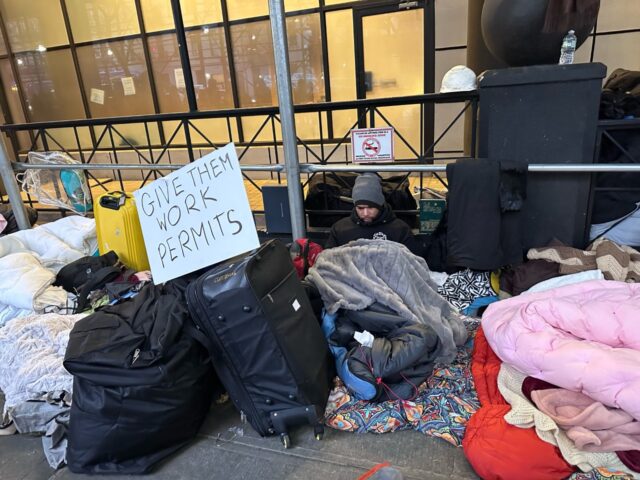
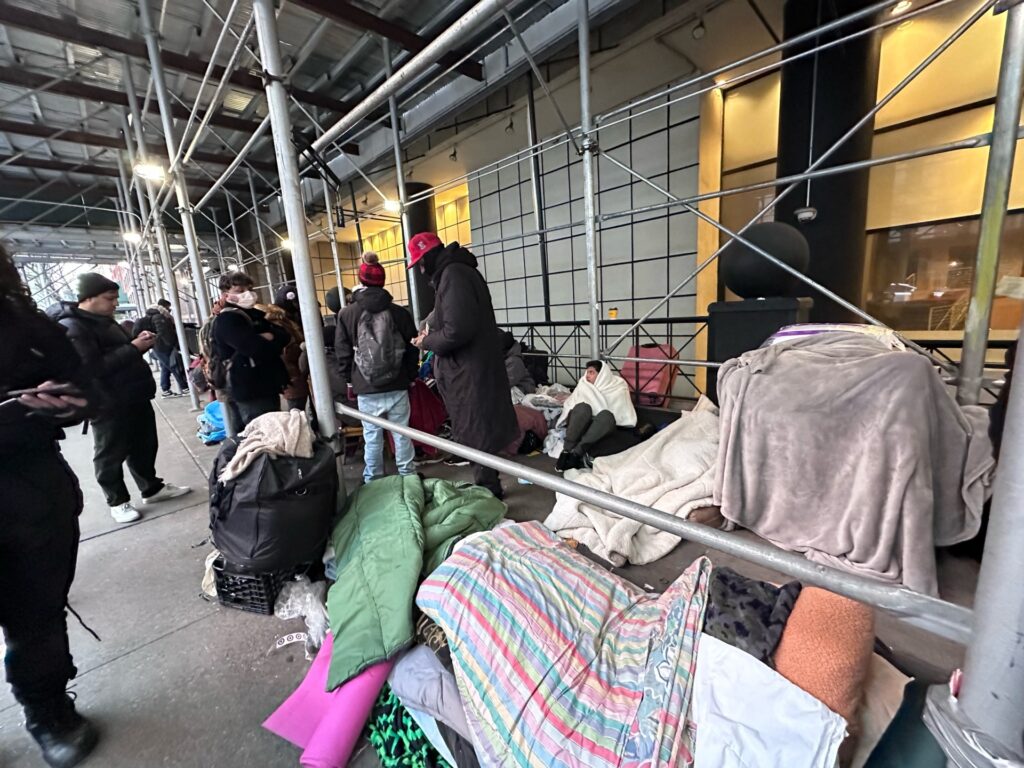
COMMENTS
Please let us know if you're having issues with commenting.